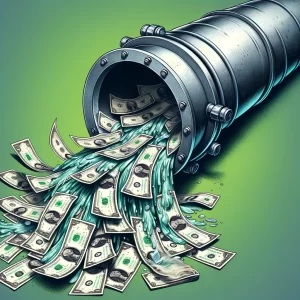Managing personal finances in today’s fast-paced world can often feel like trying to plug a leaking ship with too few hands. With the rising cost of living and financial stability seeming like a luxury, it’s more crucial than ever to identify and stop the hidden leaks draining your budget. By addressing these leaks, you can not only save money but also take a significant step towards financial freedom and security. Here’s a closer look at nine hidden money leaks to tackle today.
1. Subscriptions and Memberships
In the age of digital convenience, it’s easy to accumulate a slew of subscriptions and memberships, from streaming services to gym memberships you barely use. These can quickly add up, silently eating away at your budget. Conduct a thorough review of your bank statements to identify any recurring charges. Ask yourself if you’re truly getting value from each subscription. If not, it’s time to cancel. Consider rotating subscriptions based on your actual usage or sharing memberships with friends or family to cut costs.
2. Energy Inefficiencies
Your home’s energy inefficiencies might be costing you more than you realize. Old appliances, leaky windows, and poor insulation can lead to significant energy waste. Consider an energy audit to identify problem areas and make necessary upgrades or repairs. Switching to energy-efficient LED bulbs, fixing leaks, and adding insulation can result in substantial savings on your utility bills, making this an investment that pays off in the long run.
3. Eating Out and Takeaway
The convenience of eating out or ordering in can be a major budget buster. Cooking at home is significantly cheaper and often healthier. Start by planning your meals for the week and grocery shopping accordingly. This not only reduces waste but also minimizes the temptation to order out. Batch cooking and freezing meals can be a lifesaver on busy days, helping you resist the urge to grab expensive takeout.
4. Expensive Debt and Fees
High-interest debt, late fees, and overdraft charges are like holes in your wallet. Tackling high-interest debts should be a priority, as the longer they linger, the more they’ll cost you. Set up reminders for bill payments to avoid late fees, and consider setting up a buffer in your checking account to prevent overdrafts. Refinancing high-interest loans can also help reduce your monthly outgoings.
5. Brand Loyalty
While we all have our preferred brands, this loyalty can sometimes lead to unnecessary spending. Many generic or store-brand products are comparable in quality to their brand-name counterparts but come at a fraction of the cost. Experiment with different brands, especially for staples like medication, pantry items, and household goods. The savings from making this switch can be surprisingly substantial over time.
6. Insurance Overpayments
Insurance is essential, but that doesn’t mean you should overpay for it. Regularly reviewing and comparing your insurance policies (auto, home, life) can uncover potential savings. Many insurers offer discounts for bundling services, maintaining a good record, or even for being a loyal customer. Don’t hesitate to negotiate with your current provider or switch to a new one if you find a better deal.
7. The Convenience Trap
The lure of convenience in our fast-paced world often leads to unnecessary spending, particularly when it comes to food and services. Paying extra for pre-cut vegetables, single-serving packages, or same-day delivery services might save time, but they come at a premium. Start by identifying areas where convenience costs you more and seek alternatives. Preparing meals in bulk, for example, can be both a time-saver and a money-saver. By avoiding the convenience trap, you can plug a significant leak in your budget and redirect those funds towards more pressing financial priorities.
8. Transportation Costs
The daily commute and car ownership can be significant monthly expenses. Consider alternatives like carpooling, public transportation, biking, or even walking to nearby destinations. Regular vehicle maintenance can also prevent costly repairs and improve fuel efficiency. For those working remotely, reassessing the need for a car or switching to a more fuel-efficient model can lead to considerable savings.
9. Lack of Financial Planning
Without a clear financial plan, it’s easy to overspend or miss opportunities to save. Set short and long-term financial goals and create a budget that reflects these objectives. Regularly tracking your spending can provide insights into potential savings areas and help you adjust your habits accordingly. Consider using budgeting apps or tools to simplify this process and keep you on track.
Start Plugging Hidden Money Leaks to Regain Your Financial Sanity
Ultimately, plugging the hidden money leaks in your life requires a combination of vigilance, discipline, and a willingness to change old habits. By addressing these nine areas, you can not only stop the outflow but also redirect those funds toward building a more secure financial future.
Catherine is a tech-savvy writer who has focused on the personal finance space for more than eight years. She has a Bachelor’s in Information Technology and enjoys showcasing how tech can simplify everyday personal finance tasks like budgeting, spending tracking, and planning for the future. Additionally, she’s explored the ins and outs of the world of side hustles and loves to share what she’s learned along the way. When she’s not working, you can find her relaxing at home in the Pacific Northwest with her two cats or enjoying a cup of coffee at her neighborhood cafe.











